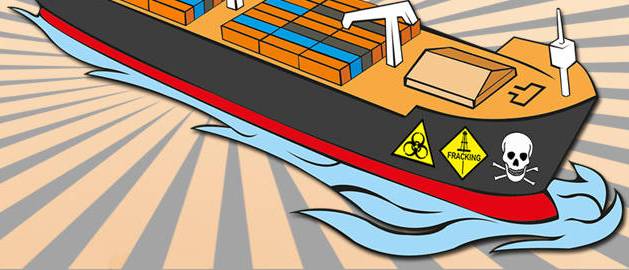Nachrichtenbeitrag
Campaign continues against EU-US free trade agreement
LONDON/BERLIN/MUNICH (NNA) – As EU and US negotiatiors sit down to the fifth round of negotiations in Arlington, Virginia this week on a controversial transantlantic free trade agreement, protests are continuing in Europe.
The Transatlantic Trade and Investment Partnership (TTIP) aims to create the largest free-trade zone in the world. The agreement proposes to reduce customs tariffs and trade barriers and protect investments against government intervention.
In Germany, more than 650,000 signatures against the TTIP have been collected by an alliance of organisations critical of the TTIP and CETA (the equivalent agreement being negotiated with Canada). The campaigning organisation for direct democracy “Omnibus für direkte Demokratie“ intends to present them to the leading candidates in the European elections in Berlin on Thursday – election day. The signatures are meant to send a “strong signal to the European Commission and the European Parliament” to respect European citizens’ right of self-determination, the organisation says.
And the organisation “campact.de. Democracy in Action” has collected almost 485,000 signatures in an online campaign to which citizens throughout the EU can put their name.
Secret negotiations
While supporters of the TTIP say that it will create a level playing field and stimulate economic growth, the proposed agreement has come in for particular criticism by opponents because of the protection it proposes to give to US companies and exporters who could sue the EU or its member states in new global tribunals if they lost profits through changes in the law or higher environmental standards in Europe. Critics see hard-won consumer protection and environmental standards at risk.
Another point of criticism is the secrecy of the negotiations which were conducted “behind closed doors and to the exclusion of the public”, as the Munich Environmental Institute puts it. Despite the far-reaching consequences of the agreement, MEPs were not being informed about its content either, the institute says in an information booklet. A public debate about the content of the TTIP was clearly being avoided.
In the neo-liberal understanding of free trade, many EU consumer protection regulations were “unwelcome obstacles to trade which have to be removed,” the environmental institute writes. As examples, it cites the more liberal US regulations regarding the hormone treatment of beef and milk cattle, and rinsing chicken meat with chlorine. All of this is currently banned in Europe. The strict EU regime on genetically modified foods would also be at risk. Furthermore, American companies were showing an increasing interest in exploiting the shale gas reserves in Europe through the controversial fracking method. The TTIP would make it harder to control their activities.
Global consequences
Although the consumer protection standards in the EU were not ideal, they were mostly a lot better than in the US, the environmental institute argues. The TTIP would place these standards at risk. But that is not all, the institute says. The rest of the world would also suffer from the TTIP.
An EU-US free trade zone would comprise almost half the economic power in the world. The aim was “de facto to impose” the standards defined by the agreement on the rest of the world. The interests of small farmers in other countries, for example, would be ignored.
“The proposed free-trade agreement TTIP between the EU and the USA serves the interests of corporations and not of citizens,” campact.de sums up the general feeling among the opponents of the agreement.
END/nna/ung/cva
Item: 190514-01EN Date: 19 May 2014
Copyright 2014 News Network Anthroposophy Limited. All rights reserved.

